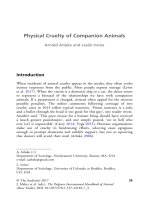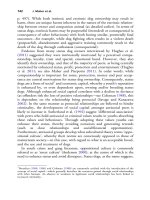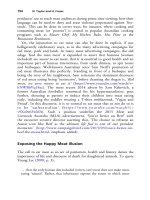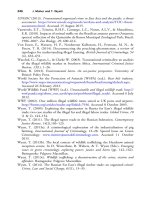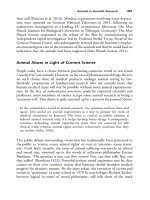The palgrave international handbook of a 109
Bạn đang xem bản rút gọn của tài liệu. Xem và tải ngay bản đầy đủ của tài liệu tại đây (37.6 KB, 1 trang )
Animal Neglect
99
omissions. Accordingly it is an offence to unnecessarily infuriate or terrify a
protected animal in addition to, or instead of, causing physical pain. Nurse
and Ryland (2013, p. 47) identify, for example, that while a police horse on
riot control duty might suffer mental pain as a consequence of being in a
stressful, violent environment, this is arguably ‘necessary’ for it to fulfil
its legitimate purpose of protecting people or property and contributing
to the maintenance of law and order (notwithstanding moral considerations about such animal use). However, a non-human companion such as
a cat or dog which is tortured or suffers intense pain as a result of neglect
before being humanely euthanised, has suffered excessively before its
demise, and it is an offence for any person to cause unnecessary (physical
or mental) suffering to a protected animal where the person committing
the act knew or ought reasonably to have known, that the act would
cause, or would be likely to cause, suffering. In addition, the law
identifies that where a person is responsible for an animal, he would
commit an offence if unnecessary suffering was caused to the animal by
his failing to take some action. UK case law clarifies that this is the case
where the person knew or ought reasonably to have known that any
omission on their part would cause, or would be likely to cause, suffering. Nurse and Ryland highlight that it is not necessary to show that the
person actually knew that his act or omission would cause suffering, but
only that he ought to have known and is required to actively understand
a specific non-human animal’s needs (2014, p. 6). Thus neglect is linked
to an objective standard of what constitutes reasonable behaviour.
Radford (2001, p. 253) highlights this point in relation to a historical
case—RSPCA v Isaacs [1994] Crim LR 517 where a defendant failed to
seek veterinary care for her dog for 10 years fearing that it might be put
down because of its condition. The Court in examining whether the
suffering was unnecessary considered that an objective test could be
applied as follows:
1. unreasonable conduct on the part of the defendant;
2. resulting in an animal suffering; and
3. that suffering being unnecessary. (Radford 2001, p. 251)
In respect of the omission or neglect on the Isaacs case, the Court thus posed
the following questions:
1. Did the dog suffer? (Answer: yes)
